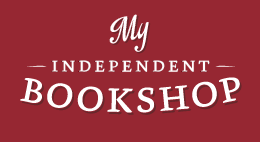April 8, 2014
Penguin Random House UK launches My Independent Bookshop, or Bookish UK
by Alex Shephard
 Yesterday, Penguin Random House UK launched My Independent Bookshop, “a new reader recommendation platform allowing book lovers to set up a virtual bookshop, share their favourite reads and discover, recommend and review books online.” According to a release accompanying the announcement, users of the social network—excuse me, reader recommendation platform—can:
Yesterday, Penguin Random House UK launched My Independent Bookshop, “a new reader recommendation platform allowing book lovers to set up a virtual bookshop, share their favourite reads and discover, recommend and review books online.” According to a release accompanying the announcement, users of the social network—excuse me, reader recommendation platform—can:
Set up their shop with twelve books at a time on their shelves—changing the display as often as they choose by season, genre or simply their mood. This could be based on their twelve favourite books or covers, the dozen books that made them cry, or, if they are an author, the last twelve books they wrote—the possibilities are endless. Users can also bring together their favourite shops from across the platform to create their own personal high street with shop owners as diverse as their best loved authors, closest friends, or local librarian, to help them find complementary and unexpected new reads.
In other words, three cups of Bookish, one of Goodreads, and a dash of Facebook for good measure.
The decision for Penguin Random House UK to launch its own social platform is not in and of itself surprising, even when one considers the fiasco that was the long-delayed launch of Bookish. Over the past few years, “discoverability” has become one of the biggest buzz words in publishing. That’s not surprising at all, when you consider the importance of showrooming (explained here) to bookselling; with fewer bookstores carrying fewer books (with exceptions, of course) and Amazon growing ever more dominant, it’s getting harder and harder to get books in front of customers. Clearly, Penguin Random House UK is seeing Bookish’s failure to take hold as the result of its bungled launch, not of the concept itself.
The decision to limit the number of books to twelve is a bit odd, but it’s makes some amount of sense if you think about it in terms of the nebulous goal of “discoverability.” The goal here isn’t to get a TON of books in front of consumers, it’s to try to make the books that are there land with consumers, er, users. There doesn’t seem to be any kind of Amazon-y algorithm in play here—at least not yet. This is analog book recommendation—the goal is for friends to reach friends and like-minded people to reach like-minded people—in the digital age.
Of course, My Independent Bookshop will certainly contribute to the growing listification of the internet, but the book world has been inundated with lists for years—my colleague Dustin Kurtz wrote a piece about the poorly named, vaguely My Independent Bookshop-y Bookateria in 2012 called “Admit it, all you really want are lists of books.” In the land of Buzzfeed, the platform with the most viral content is King.
Lists aside, one of the best things about My Independent Bookshop is that it lives up to its name. According to The Bookseller:
Readers can buy the titles they see on My Independent Bookshop profiles through Hive, the e-commerce arm of Gardners wholesalers, which is connected to 350 independent bookshops in the UK. Users can choose their favourite real-world independent bookshop to connect with when they register and bookshops will receive a minimum of 5% commission on book orders and 8% on e-books orders.
Of course, those numbers aren’t going to bowl anyone over—they’re comparable, if slightly lower, to those offered by the Amazon Affiliate Program, for instance—but the gesture is nevertheless important, especially if this thing takes off. My Independent Bookshop is clearly taking “independent bookstore” fairly abstractly, but it’s nice to see that they’re valuing the real things. Bolstering bookshops is a win for “discoverability,” too, so the partnership makes sense on a few levels.
Of course, a social network with no users can hardly be called a social network (or, whatever, reader recommendation engine, sorry). With the site in closed beta, it’s difficult to get one’s hopes up—it’s more difficult, still, when, at the end of the day yesterday, a YouTube video explaining the new platform had a respectable, if completely underwhelming, 371 views. Moreover, despite the importance of “discoverability” (and the greater importance of the buzzword “discoverability”) there’s no real sense that these engines actually make people discover and purchase books: social networks tend to take off when they meet the demands of users; social networks like Bookish and My Independent Bookshop aspire to meet the goals of publishers first and those of users second—whether they end up meeting anyone’s goals is anyone’s guess.
Still, there’s a lot to learn about My Independent Bookshop and, out of the gate, it seems to have a lot going for it: it’s ambitious, but not too ambitious (i.e. it’s not setting out to drive a lance into Amazon); it could end up boosting independent bookstores and shouldn’t end up hurting them; readers may—just may—find out about books they wouldn’t have otherwise. And, hey, the internet can always use more lists.
Alex Shephard is the director of digital media for Melville House, and a former bookseller.